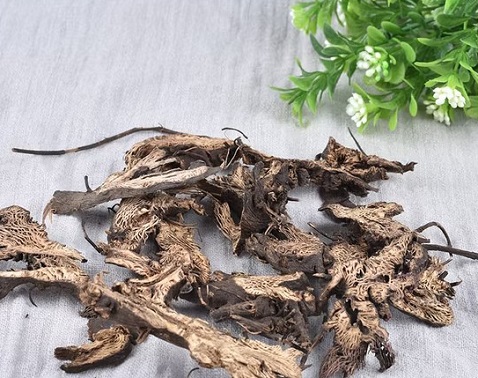Nikhil Prasad Fact checked by:Thailand Medical News Team Dec 31, 2024 1 year, 1 week, 1 day, 14 hours, 43 minutes ago
Medical News: Acute pneumonia, a severe lung infection, continues to pose a serious public health challenge worldwide. Although antibiotics are often used for treatment, their overuse has led to growing bacterial resistance, rendering them less effective. In this context, researchers from Jiangxi University of Chinese Medicine in China have turned to traditional remedies to uncover alternative solutions. Their recent study on Cimicifugae Rhizoma, a key herb in traditional Chinese medicine, sheds light on its potential as a natural treatment for acute pneumonia.
 Medicinal Herb Cimicifugae Rhizoma Shows Promise in Treating Acute Pneumonia
Medicinal Herb Cimicifugae Rhizoma Shows Promise in Treating Acute Pneumonia
This
Medical News report explores how the team, comprising experts from the Research Center for Chinese Medicine Resources, the School of Pharmacy, and the Affiliated Hospital of Jiangxi University of Chinese Medicine, conducted their research. Employing state-of-the-art techniques like ultra-performance liquid chromatography (UPLC) and bioinformatics, the researchers identified several active compounds in Cimicifugae Rhizoma and explored their anti-inflammatory mechanisms in detail.
Cimicifugae Rhizoma and Its Components
Cimicifugae Rhizoma, derived from the dried rhizomes of plants like Cimicifuga heracleifolia and Cimicifuga dahurica, has been long valued in Chinese medicine for its heat-clearing and detoxifying properties. It contains a diverse array of phytochemical compounds, including triterpenoids, phenolic acids, and alkaloids. These compounds are known for their anti-inflammatory, anti-viral, and immune-boosting effects, which make the herb a promising candidate for combating infections like acute pneumonia.
The study analyzed 122 phytochemical components using advanced mass spectrometry and established a network pharmacological library to predict active compounds. Further, bioinformatics tools identified pathways and targets relevant to the herb's therapeutic effects.
The Study Approach
To simulate pneumonia, researchers used a lipopolysaccharide (LPS)-induced inflammation model in human lung epithelial cells. Key compounds, such as isoferulic acid, cimifugin, and ferulic acid, were tested for their ability to inhibit inflammatory responses. Molecular docking experiments revealed these compounds strongly bind to proteins associated with inflammation, such as IL-6 and STAT3.
The researchers performed in vitro experiments to measure the effectiveness of Cimicifugae Rhizoma extracts and its isolated compounds. Results showed that isoferulic acid and cimifugin were particularly effective in reducing markers of inflammation like TNF-α and IL-1β.
Key Findings and Mechanisms
The study identified four major active phytochemical compounds -isoferulic acid, cimifugin, ferulic acid, and N-cis-feruloyltyramine - as the primary agents responsible for Cimicifugae Rhizoma's anti-inflammatory effects. These compounds demonstrated a strong ability to modulate the IL-6/JAK/STAT3 and TLR4/IL-1β-IRAK pa
thways. These pathways are critical in the inflammatory processes associated with pneumonia.
Isoferulic acid showed the highest efficacy, followed by cimifugin, CR alcoholic extracts, N-cis-feruloyltyramine, and ferulic acid. By downregulating key inflammatory cytokines and proteins like P-STAT3 and NF-κB, the compounds effectively mitigated inflammation in lung cells.
Broader Implications
The findings suggest that Cimicifugae Rhizoma could serve as an adjunct or alternative to antibiotics in pneumonia treatment, particularly in cases complicated by antibiotic resistance. Its ability to target multiple pathways adds to its therapeutic potential. However, while the in vitro results are promising, the researchers emphasize the need for further clinical studies to validate these findings in human populations.
Conclusions
The study provides compelling evidence for the use of Cimicifugae Rhizoma in treating acute pneumonia. By isolating and analyzing the herb's active compounds, researchers have not only highlighted its medicinal value but also expanded our understanding of natural remedies in combating respiratory infections. This research bridges the gap between traditional medicine and modern pharmacology, offering a promising avenue for developing new therapies.
In summary, the research underlines the herb's ability to modulate critical inflammatory pathways and reduce the harmful effects of pneumonia. These findings pave the way for future studies to explore its clinical applications further. As a natural and potentially less harmful alternative to synthetic drugs, Cimicifugae Rhizoma offers hope in addressing antibiotic resistance and enhancing pneumonia management.
The study findings were published in the peer-reviewed Journal of Inflammation Research.
https://www.tandfonline.com/doi/full/10.2147/JIR.S489691
For the latest on Herbs and Phytochemicals, keep on logging to Thailand
Medical News.
Read Also:
https://www.thailandmedical.news/news/herbal-remedies-for-acute-lung-injury-hold-promise-for-safer-effective-treatment-options
https://www.thailandmedical.news/news/herbs-and-phytochemicals-ocimum-gratissimum-extracts-show-promise-in-the-fight-against-lung-cancer
https://www.thailandmedical.news/articles/herbs-and-phytochemicals
https://www.thailandmedical.news/articles/tcm-news
https://www.thailandmedical.news/articles/covid-19-herbs
